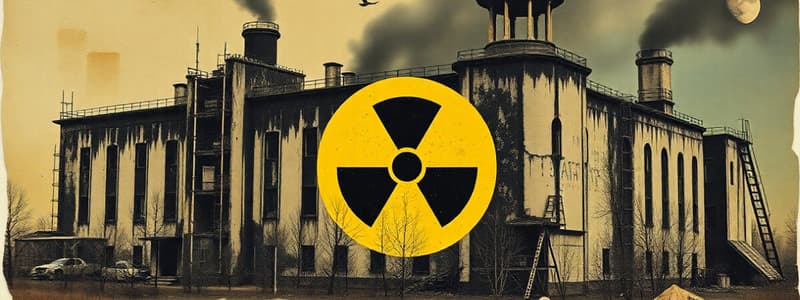Podcast
Questions and Answers
What was the primary action taken by Alexi Ananenko, Valeri Bezpoalov, and Boris Baronov?
What was the primary action taken by Alexi Ananenko, Valeri Bezpoalov, and Boris Baronov?
- They operated robots to control the situation.
- They entered contaminated water to release a valve. (correct)
- They left the area to save themselves.
- They managed the power plant effectively.
All three men who entered the radioactive water died immediately after.
All three men who entered the radioactive water died immediately after.
False (B)
What term is commonly used to refer to Ananenko, Bezpoalov, and Baronov?
What term is commonly used to refer to Ananenko, Bezpoalov, and Baronov?
Chornobyl Suicide Squad
Andrew Carnegie's Hero Fund has recognized more than ______ people for acts of heroism.
Andrew Carnegie's Hero Fund has recognized more than ______ people for acts of heroism.
Match the following individuals with their contributions during the Chornobyl disaster:
Match the following individuals with their contributions during the Chornobyl disaster:
What motivated many of those involved in the Chornobyl response despite knowing the risks?
What motivated many of those involved in the Chornobyl response despite knowing the risks?
Scientists are puzzled by cases of people who ignore their survival instincts.
Scientists are puzzled by cases of people who ignore their survival instincts.
What common belief do heroes have regarding their actions according to Professor Earl Babbie?
What common belief do heroes have regarding their actions according to Professor Earl Babbie?
Flashcards
Chornobyl Suicide Squad
Chornobyl Suicide Squad
A group of three men who volunteered to enter a highly radioactive environment at the Chornobyl nuclear plant to release a valve and prevent a catastrophic explosion.
Survival Instinct
Survival Instinct
The instinct that drives humans to prioritize their own survival above all else.
Heroism
Heroism
Acts of courage or selflessness that prioritize the well-being of others over oneself, often in situations involving risk or personal sacrifice.
Heroic Humility
Heroic Humility
Signup and view all the flashcards
Sacrifice
Sacrifice
Signup and view all the flashcards
Ignoring Survival Instinct
Ignoring Survival Instinct
Signup and view all the flashcards
Parental Sacrifice and Survival Instinct
Parental Sacrifice and Survival Instinct
Signup and view all the flashcards
Carnegie Hero Fund
Carnegie Hero Fund
Signup and view all the flashcards
Who was the Chornobyl Suicide Squad?
Who was the Chornobyl Suicide Squad?
Signup and view all the flashcards
What is the survival instinct?
What is the survival instinct?
Signup and view all the flashcards
Define Heroism.
Define Heroism.
Signup and view all the flashcards
What is Heroic Humility?
What is Heroic Humility?
Signup and view all the flashcards
What happened at Chornobyl?
What happened at Chornobyl?
Signup and view all the flashcards
How can parental sacrifice be linked to the survival instinct?
How can parental sacrifice be linked to the survival instinct?
Signup and view all the flashcards
What is the Carnegie Hero Fund?
What is the Carnegie Hero Fund?
Signup and view all the flashcards
What is self-sacrifice?
What is self-sacrifice?
Signup and view all the flashcards
Study Notes
Chornobyl Disaster and Unsung Heroes
- In 1986, a nuclear power plant in Chornobyl, Ukraine, released deadly radioactive material.
- Workers couldn't stop the disaster without risking their own lives.
- The plant was in danger of exploding.
- The only way to prevent the explosion was to enter toxic, radioactive water and release a valve. Robots couldn't function in the water.
- Alexi Ananenko, Valeri Bezpoalov, and Boris Baronov, knowing it was a death mission, entered the contaminated water. In scuba gear, they released the valve.
- This prevented a nuclear meltdown.
- Saving hundreds of thousands of lives, they became known as the Chornobyl Suicide Squad. While reported dead initially, they survived.
- Thousands involved in the Chornobyl response and cleanup died due to radiation. Estimates suggest approximately 60,000 Ukrainians, Russians, and Belarusians died; many consciously risked their lives.
The Psychology of Heroism
- Human instinct prioritizes survival.
- Heroes seem to ignore this intrinsic drive, overriding their personal safety for others.
- Sacrificing for children could be related to protecting the continuation of genes – a survival instinct.
- Scientifically, understanding heroic acts is still challenging.
- Heroic action is frequently evoked by the immediate danger to another human.
Carnegie's Hero Fund
- Andrew Carnegie studied heroes, establishing a Hero Fund (1904) recognizing over 80,000 acts of selfless heroism.
- Carnegie's observations revealed a key element: heroes often don't recognize their actions as heroic.
- Heroes generally perceive their actions as standard responses; they would do it anyway.
Studying That Suits You
Use AI to generate personalized quizzes and flashcards to suit your learning preferences.




